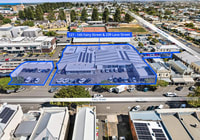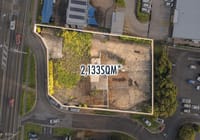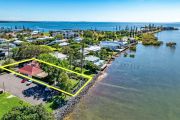
The billionaire, his $80b gorilla mate and Storage King’s clean-up job
Self-storage is a $20 billion industry most Australians would seldom think about.
The business is relatively straightforward: a mix of big players and family operators, who have a combined 697,000 storage units for lease across more than 2000 sites.

Nearly nine in 10 of the units are occupied as users pay an average $380 per square metre a year to park their stuff. One in 10 adult Australians use self-storage, according to the industry association.
Self-storage stores emerged in Australia in the 1970s and are now big business. Two of the three big players – National Storage REIT and Storage King – are listed on the ASX, while the third is the guts of Sam Kennard’s $3.3 billion family empire.
They are valuable property plays – similar to warehouses and even office buildings – with money to be made.
Behind the scenes, there is a cracking battle brewing for one of the three national players – the country’s most recognised storage brand, Storage King, and its owner/manager, ASX-listed Abacus Storage King, which owns 126 storage sites and manages or licenses another 75.
The group, with $3.3 billion in assets, is in play after a dud corporate deal left it illiquid, unloved and wrapped up in an out-of-fashion, externally managed structure two years ago. Its shares were trading at a 28 per cent discount to asset backing a month ago before some familiar faces came to clean up the mess.

The bid came from Public Storage, an $80 billion gorilla from the United States, and Ki Corporation, which is 93-year-old Swazi-South African billionaire Nathan Kirsh’s family office, which is Abacus Storage King’s largest shareholder and an investor in the current business and its predecessor since 2009. Kirsh has an effective 59.5 per cent stake.
The powerful duo wants to take Abacus Storage King off the bourse in a 50/50 deal.
It should be a dream bid for Abacus Storage King’s board. Public Storage is one of the biggest names in the sector globally and has been sniffing around Australia’s big players in recent years while controlling shareholder Ki Corporation knows Abacus Storage King, its manager Abacus Group and the assets very well.
The bid was lobbed at a 26.7 per cent premium to the then-traded price. Abacus Storage King responded by setting up a board committee, activating bankers and lawyers and is revaluing its properties – all standard stuff.
The problem is, Public Storage and Ki Corp’s offer is cheap. The pair wants to buy the rest of Abacus Storage King for $1.47 a share, or 8 per cent less than Abacus Storage King’s net tangible asset backing on December 31.
A lot of REITs are trading at discounts to asset backing, but few are sponsoring takeovers at discounts. You could question whether Abacus Storage King’s assets really are worth $1.60 a share, although Ki Corp would be questioning a number signed off by a board it is represented on.
So, Abacus Storage King’s independent board committee is shaping up like it is preparing to defend itself from a controlling shareholder, which is always tricky.
It is even trickier because the Ki Corp has publicly pointed out some harsh truths in last month’s offer letter, and said that it would not put more money into Abacus Storage King in its current form. It also casts doubt on the company’s ability to grow and pay dividends, which for REITs is the equivalent of walking and chewing gum.
“Continuation of the status quo is not viable,” said Sir Bradley Fried, who runs Ki Corp, in the April 4 letter.
It makes for an M&A doozy – a David and Goliath battle between a controlling shareholder in bed with a global strategic heavyweight, and Abacus Storage King’s suffering minority investors, who are only feeling better about life now that someone is doing something about the group’s dreadful share price performance.
Former Credit Suisse Australia chairman John O’Sullivan, who now chairs Storage King, is jammed in the middle.
Wild card investor
When some of Abacus Storage King’s bigger minority investors meet their company – which is managed by ASX-listed Abacus Group – this week, you can bet they will say “no way” to an offer 8 per cent below NTA.
They recognise the structural challenges, but they’d prefer to see management sell a few properties to shore up that NTA number and return capital to investors rather than sell on the cheap.
Deliciously, the minority shareholders include arch-rival National Storage REIT, Australia’s biggest self-storage group with about 15 per cent market share. It has hoovered up stock in the past month under the cover of darkness, buying via a retail stockbroker. It disclosed a 5.1 per cent stake last week.
National Storage also doesn’t want to see Abacus Storage King disappear on the cheap.
Why not? “It’s not a complex strategy,” National Storage boss Andrew Catsoulis says. “We think they’re strong assets. They’re the second-largest portfolio of storage assets behind us in the market, they have strong management, good branding and high-quality sites. So, why wouldn’t you want to invest in them at the right price?”

In his mind, NTA should only be the starting point – that number aggregates separately valued properties and gives no consideration to scale, which is important, nor management rights, goodwill or any network effects.
And if Abacus Storage King was privatised on the cheap, what would be stopping something similar at National Storage?
“I think it is important if it is sold, it is for the full and fair value to not only protect minority interests here but not set a damaging precedent for the sector. We’re not looking to be antagonistic, but we do think any transaction should happen at a full and fair value that appropriately safeguards and protects interests.”
It is an unusual move. Australian property investment groups take stakes in each other sporadically. Abacus was on National Storage’s register for a while, for example – but they don’t normally get involved in each other’s takeovers to stick up for their sector.
It feels like National Storage is either trying to make a quick buck like an M&A arbitrage fund or wants to divert Public Storage’s attention back to itself. They were in talks five years ago.
Ironically, Abacus Storage King probably wouldn’t be in this vulnerable position if it wasn’t for National Storage, which pioneered institutional equity capital into Australian self-storage by listing in December 2013.
Storage King used to be tucked up inside ASX-listed office property owner Abacus Group before it was spun out, technically de-stapled, to unlock value in August 2023.
Why did they think it would unlock value? Because Catsoulis’ National Storage had done such a good job using the ASX, institutional capital and small-cap punters to fund growth – new sites and M&A – that Abacus thought Abacus Storage King could do the same.
The Storage King story resonated enough to raise $225 million to be spun off. However, Abacus squandered the early momentum. Investors sat in an information vacuum for the first six months post-listing, they say, and by then the spin-off had been dropped from the benchmark S&P/ASX200 and much of the market had moved on.
Abacus Storage King never recovered and traded at a persistent discount to asset backing and National Storage’s stronger valuation. Analysts blame a combination of an externally managed structure, leverage, illiquidity and size. Without strong scrip, Abacus Storage King lost its ability to tap equity capital markets for affordable growth capital.
The other lingering question is: how hard does Abacus Storage King want to fight?
Remember Abacus Storage King is managed by Abacus Group, which is controlled by Ki Corp, and the two Abacus entities share the same managing director, Steven Sewell.
When Ki Corp and Public Storage’s bid was announced, Sewell posted on LinkedIn: “Exciting development today for the Abacus Storage King business, attracting strong interest of a global leader in the self-storage sector, and ongoing support of our long-term major investor”.
Does Ki Corp’s bid at an 8 per cent discount to NTA and calling for an overhaul of Abacus Storage King’s structure classify as “ongoing support”? Sure, Ki Corp wants to own the assets in the future alongside Public Storage, but it is also trying to blow up the joint.
Sewell’s post has been deleted.
For now, the ball is now in Abacus Storage King’s court. Its corporate structure is misfiring, investors are disappointed, and it has a chance to find an outcome that will work for everyone. Most importantly, it has a big buyer at the table.
Getting the properties buys time – always useful in sticky transactions such as this – and gives the two sides a natural talking point when the numbers land. There are also tax issues to sort out at a time when dealmakers are nervous about the Australian Taxation Office.
But surely this one is about price. Sometimes a big deep-pocketed bidder like Public Storage and Ki Corp has to lob a bit of a cheap bid and talk tough to get expectations in check. Once the dust settles, proper negotiations can begin.
National Storage’s entry makes finding that deal more complicated. It says it doesn’t want to be antagonistic, but it is clearly marking its territory as the top dog in Australia’s $20 billion self-storage sector.
If global giant Public Storage wants to buy its way in, it is going to have to come up with something more.











